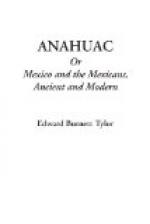In the question of the population of Mexico, one begins to speculate why—in a country with a splendid climate, a fertile soil, and almost unlimited space to spread in, the inhabitants do not increase one-half so fast as in England, and about one-sixth as fast as their neighbours of the United States. One of the most important causes which tend to bring about this state of things is the impossibility of conveying grain to any distance, except by doubling and trebling its price. The disastrous effects of a failure of the crop in one district cannot be remedied by a plentiful harvest fifty miles off; for the peasants, already ruined by the loss of their own harvest, can find neither money nor credit to buy food brought from a distance at so great an expense. Next year may be fruitful again, but numbers die in the interval, and the constitutions of a great proportion of the children never recover the effects of that one year’s famine.
We left the regular road and struck up still higher into the hills, riding amongst winding roads with forest above and below us, and great orchids of the most brilliant colours, blue, white, and crimson, shining among the branches of the oak-trees. The boughs were often breaking down with the bulbs of such epiphytes; but as yet it was early in the season, and only here and there one was in flower. At the top of the hill, still in the midst of the woods, is the Desierto, “the desert,” the place we had selected for our noon-day halt. There are many of these Desiertos in Mexico, founded by rich people in old times. They are a kind of convent, with some few resident ecclesiastics, and numbers of cells for laymen who retire for a time into this secluded place and are received gratuitously. They spend a week or two in prayer and fasting, then confess themselves, receive the sacrament, and return into the world. The situation of this quiet place was well chosen in the midst of the forest, and once upon a time the cells used to be full of penitents; but now we saw no one but the old porter, as we walked about the gardens and explored the quadrangle and the rows of cells, each with a hideous little wood-cut of a martyr being tortured, upon the door.
Thence we rode down into the plain, looking down, as we descended, upon a hill which seemed to be an old crater, rising from the level ground; and then our path lay among broad fields where oxen were ploughing, and across marshes covered with coarse grass, until we came to the quaint little town of Tenancingo. There we found the meson; and the landlord handed us the key of our room, which was square, whitewashed, and with a tiled floor. There was no window, so we had to keep the door open for light. The furniture consisted of three articles,—two low tables on four legs, made of rough planks, and a bracket to stick a candle in. The tables were beds after the manner of the country; but, as a special attention to us, the patron produced two old mattresses;




